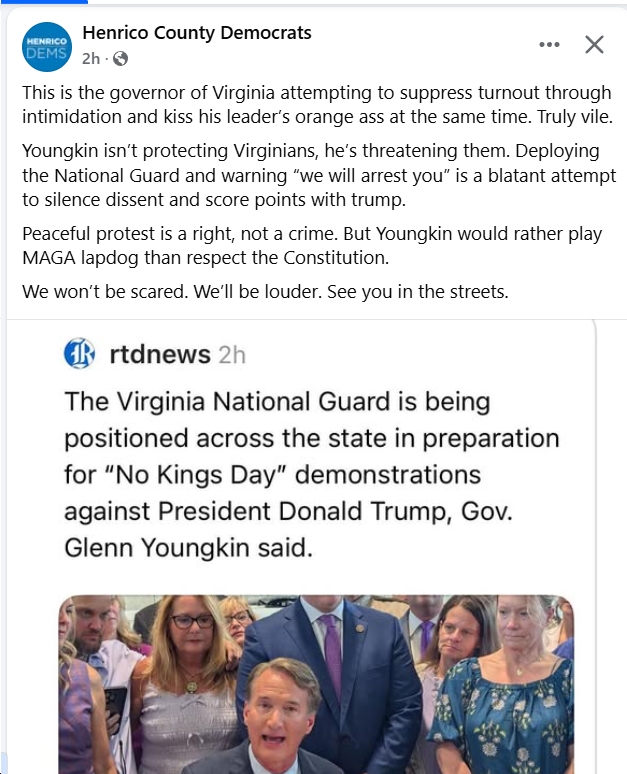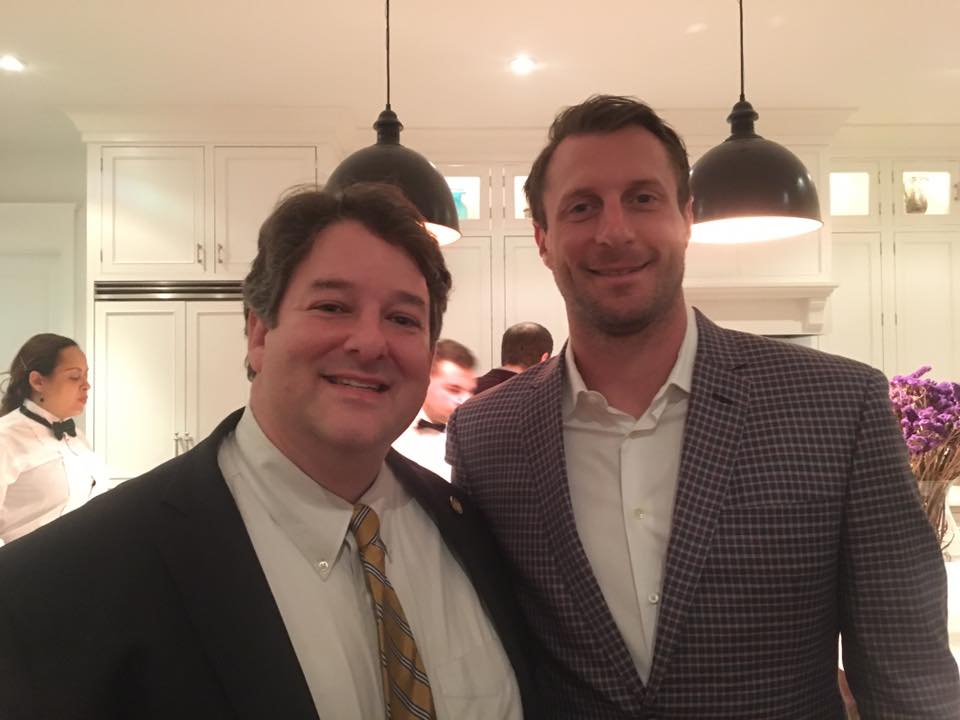As a Virginia Democratic political blogger who lives in the 8th CD, I get pitched on stories by the various 8th CD Democratic candidates fairly frequently. Some of the pitches are good ones (e.g., newsworthy, interesting), some of them are “meh,” and some are…well, let’s just say, not worth blogging about.
One of those “definitely not worth blogging about” pitches came a couple weeks ago, when I was informed that – are you sitting down now? – a certain 8th CD Democratic candidate was against gay marriage back in 1997. I’m being snarky here not because this isn’t a serious issue, but for several other reasons:
1) Back in the late 1990s, according to Gallup, support for same-sex marriage was very low, in the 27%-30% range (vs. opposition in the 60s).
2) Overwhelmingly, prominent Democratic politicians weren’t out front of public opinion on this issue. For instance, in 1996, Bill Clinton said upon signing the deplorable “Defense of Marriage Act,” “I have long opposed governmental recognition of same-gender marriages and this legislation is consistent with that position.” Also in 1996, Clinton said to The Advocate, “I remain opposed to same-sex marriage. I believe marriage is an institution for the union of a man and a woman.” That was pretty much the typical position of Democratic politicians back then, with very few exceptions. For instance, Al Gore said he agreed with George W. Bush’s statement in a debate that “I’m not for gay marriage. I think marriage is a sacred institution between a man and a woman.” Finally, a gay friend of mine notes that not even Howard Dean was for same-sex marriage in 2003 (let alone 1997), and that in the 2003-2004 Democratic presidential primaries, only Dennis Kucinich, Al Sharpton, and Carol Moseley Braun were for same-sex marriage. Nobody else in the 2003/2004 Democratic primary field had “evolved” that far, including eventual 2004 Democratic Presidential nominee John Kerry (he said that “for historical, cultural and religious reasons, most in American society regard marriage as a ‘union between a man and a woman,'” and that he supported “civil unions”). (Also note that neither Hillary Clinton nor Barack Obama were for same-sex marriage in 2008)
3) As for Virginia Democrats, other than the courageous Chuck Robb, I’m not sure if any other prominent one supported same-sex marriage back in 1997. That’s to Chuck Robb’s credit, and everyone else’s detriment I suppose, but again, support for same-sex marriage was clearly a minority position back in 1997, one that very few politicians were willing to adopt publicly. (Note: Jim Moran and Bobby Scott both voted against DOMA in 1996)
I’d be curious, by the way, to know what the positions of all the current 8th CD Democratic candidates were on this issue back in 1997, but of course many of these folks weren’t even involved in politics back then. One candidate certainly was involved in politics back then, serving as Virginia’s Lt. Governor and running as the Democratic nominee for governor. That candidate would be Don Beyer, and back in 1997 he was not for same-sex marriage. As the Washington Blade recently reported, in a 1997 debate, Beyer said: “I disagree with Sen. Robb that homosexual marriages should be the law in Virginia or in America…I value the American family. I do not believe that we should have discrimination on the basis of many different things in Virginia, but I do not think we should elevate a homosexual relationship to the status of a civil marriage.” Which, again, sad to say, was the position of most Americans – and certainly most politicians – at the time. But it was nothing unusual back then; in fact, quite the contrary.
Which brings us to this response in the Blade, entitled “Beyer a longtime LGBT rights supporter.” It turns out, as the response letter points out, that Beyer donated $5,000 in 2006 to the effort aimed at stopping the anti-gay-marriage, “Marshall-Newman” amendment to Virginia’s constitution. In addition, the letter’s author writes, “When my partner and I decided to start our own family in 2002, Don and his wife were among the first of our friends, gay or straight, to offer to help us.” And, while the letter’s author is incorrect that Howard Dean supported gay marriage in his 2003/2004 presidential campaign, Dean was certainly a progressive on LGBT equality issues. Anyway, the bottom line is that Beyer has certainly not been worse than most other Democrats on this issue, and arguably has been better (e.g., an earlier supporter than many).
In the end, this really illustrates the hazards of comparing current moral standards to ones from the past. For instance, if we were to judge Abraham Lincoln by the standards of today, he’d be considered a vicious racist (e.g., Lincoln said if he could preserve the union by keeping slavery, getting rid of slavery, or freeing some slaves but not others, he would). Same thing with almost any U.S. President in the 19th Century. How about attitudes towards women or Native Americans? Most U.S. politicians of the 19th and early 20th centuries would be seen as barbarci by today’s standards, and rightfully so. But that’s the way it was back then. Same thing with attitudes on many other subjects. For example, according to Gallup, back in 1958 only 4% (!!!!) of Americans approved of interracial marriages. Heck, that percentage was still only at 29% in 1972, AFTER the civil rights movement, and STILL under 50% in 1994! So, clearly, attitudes on interracial marriage have shifted rapidly in this country over the past few decades, and the shift on gay marriage has arguably been even faster. Which is why it’s so tricky to apply today’s moral standards to people’s views years or even decades ago. And that’s why I thought that attacking Don Beyer for this was absurd, and why in fact, Beyer has actually “evolved” faster than most on this issue. Frankly, he should be praised for that, not criticized!

















